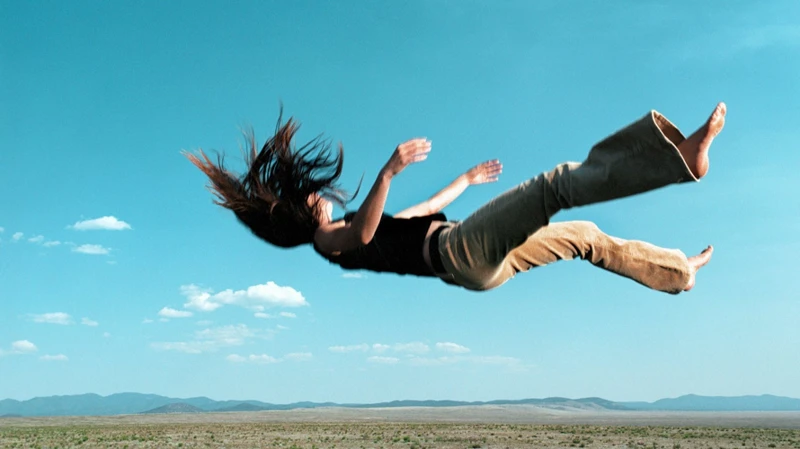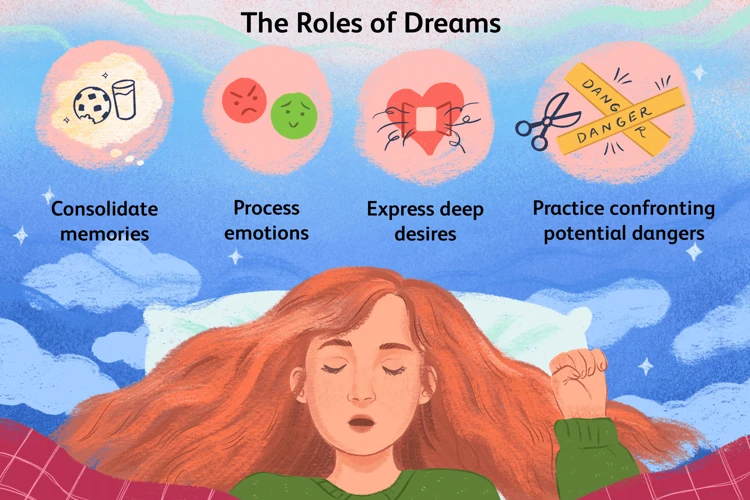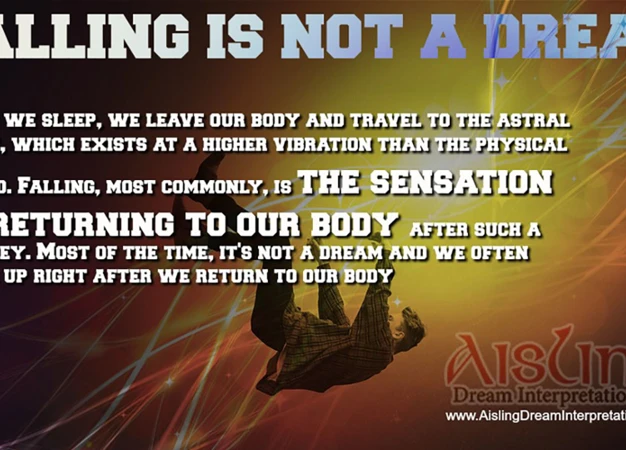Have you ever woken up in a cold sweat after experiencing a dream where you were falling? Falling dreams are incredibly common and can leave us with a sense of unease and confusion. What do these dreams mean? And why do we often experience physical sensations during these dreams? In this article, we will delve into the significance of falling dreams and explore the various physical sensations that accompany them. By understanding these sensations and their possible interpretations, we can gain insight into our subconscious mind and learn how to manage and interpret these dreams more effectively. So, let’s dive into the fascinating world of falling dreams and uncover the hidden messages they may hold.
The Significance of Falling Dreams

Falling dreams hold significant symbolism and can provide valuable insight into our subconscious mind. These dreams often convey a sense of vulnerability, powerlessness, or loss of control. They may reflect feelings of insecurity, anxiety, or fear of failure. Falling dreams can be indicative of a lack of stability in our waking lives, whether it be in our relationships, career, or personal goals. They may also represent a need for change or a fear of the unknown. Additionally, falling dreams can be associated with the fear of letting go and facing the consequences of our actions. They may serve as a gentle reminder that we should confront our fears and take proactive steps to overcome them. Understanding the significance of falling dreams can help us address these underlying emotions and work towards personal growth and self-improvement. To dive deeper into the interpretation of falling dreams, click here.
The Physical Sensations in Falling Dreams

Falling dreams are not just accompanied by vivid imagery, but they also come with a range of physical sensations that can feel remarkably real. These sensations can intensify the overall experience and leave a lasting impression upon awakening. One of the most common physical sensations in falling dreams is a rapid heartbeat. Our heart pounds as if it’s trying to escape our chests, mirroring the adrenaline rush we would feel in a real-life falling situation. Another sensation is body jerks, where our muscles twitch, causing a sudden jolt or jerk. These jerks can startle us awake and often occur as our brain tries to make sense of the sensation of falling. Additionally, a feeling of weightlessness is commonly experienced during falling dreams. It’s as if gravity momentarily releases its grip, creating a sensation of floating or flying. Another notable physical sensation is the stomach drop, which can be likened to the feeling we get when descending on a roller coaster. This sensation is often accompanied by a fluttery or sinking feeling in our stomachs. Lastly, sweating is a common occurrence during falling dreams. The body’s natural response to fear and anxiety is to perspire, as if we are exerting physical effort while falling. Exploring and understanding these physical sensations in falling dreams can provide valuable insights into our subconscious mind and how it manifests fear and other emotions. To learn more about overcoming the fear of falling dreams, click here.
1. Rapid Heartbeat
Rapid heartbeat is one of the common physical sensations experienced in falling dreams. As we plummet through the dream world, our heart rate often increases, reflecting the heightened sense of adrenaline and fear that accompanies the dream. This rapid heartbeat can feel incredibly real, causing us to wake up with a pounding chest and a sense of lingering anxiety. The physiological response of a racing heart during a falling dream is a direct reflection of our body’s reaction to stress and fear. It is our body’s way of preparing for potential danger, even though the danger is only perceived within the dream state. The intensity of the rapid heartbeat can vary from person to person, and it may also be influenced by the emotional significance of the dream itself. To learn more about the connection between falling dreams and the fear of failure, click here.
2. Body Jerks
One of the physical sensations commonly experienced during falling dreams is body jerks. These sudden, involuntary movements can startle us and even wake us up abruptly. It feels as though our body is jolting or twitching uncontrollably. These body jerks are known as hypnic jerks or sleep starts and are believed to be a natural part of the sleep cycle. While the exact cause of hypnic jerks is not fully understood, some theories suggest that they may be a result of a sudden relaxation of the muscles combined with a surge of electrical activity in the brain. This phenomenon is more likely to occur during the transition from wakefulness to sleep or during periods of stress or fatigue. It is important to note that experiencing body jerks during falling dreams is generally harmless and does not indicate any underlying health issues. However, if these jerks occur frequently and disrupt your sleep, it may be helpful to practice relaxation techniques before bed or consult with a healthcare professional. Understanding the physical sensations, such as body jerks, that occur during falling dreams can help us differentiate between dream and reality, easing any concerns or anxieties we may have.
3. Weightlessness
Weightlessness is a common physical sensation experienced in falling dreams. During these dreams, individuals often report a feeling of floating or flying through the air, as if gravity has momentarily lost its hold. This sensation can be both exhilarating and disorienting, adding to the overall intensity of the dream. The experience of weightlessness in falling dreams may symbolize a desire for freedom, liberation, or a release from burdens that weigh us down in our waking lives. It can represent a longing for a sense of lightness and ease, where we can let go of our worries and responsibilities. The sensation of weightlessness in falling dreams may also suggest a need to detach ourselves from situations or relationships that are weighing heavily on us. It can serve as a reminder to embrace change and break free from the constraints that hold us back. This physical sensation, when interpreted in the context of a falling dream, encourages us to explore our inner desires and make positive changes in our lives to achieve a state of emotional or psychological liberation.
4. Stomach Drop
The sensation of a stomach drop is one of the most common physical experiences during falling dreams. It is often described as a sudden and intense feeling of weightlessness in the pit of the stomach. This sensation can be quite unsettling and may even mimic the feeling of being on a roller coaster or descending rapidly in an elevator. The stomach drop in falling dreams is closely connected to our sense of fear and vulnerability. It is believed to be a physiological response triggered by the brain as it tries to make sense of the dream scenario. The sudden and unexpected descent in the dream creates a surge of adrenaline, which can affect the digestive system and lead to the stomach drop sensation. This physical experience serves as a reminder of the emotional impact that falling dreams can have on us. It is crucial to pay attention to this sensation and reflect on any underlying fears or insecurities that may be surfacing during these dreams. By acknowledging and addressing these emotions, we can gain a deeper understanding of ourselves and work towards personal growth and emotional well-being.
5. Sweating
One common physical sensation experienced in falling dreams is sweating. As you plummet through the dream landscape, you may find yourself drenched in sweat upon waking up. Sweating during falling dreams is often associated with the intense emotions and adrenaline rush that accompany the dream experience. It is a natural physiological response to stress or fear. When we are faced with a fearful or anxiety-inducing situation, our body activates the fight-or-flight response, releasing stress hormones such as adrenaline, which can lead to sweating. In the context of falling dreams, sweating can indicate the heightened stress, anxiety, or fear that we may be experiencing in our waking lives. It could be a reflection of the pressures we feel or the challenges we are currently facing. Sweating in falling dreams can also be a manifestation of our body’s attempt to regulate its temperature during moments of intense mental or emotional activity. While sweating during falling dreams is not uncommon, it is essential to recognize and address the underlying emotions that may be triggering these physical reactions. Understanding the connection between sweating and falling dreams can provide valuable insights into our emotional well-being and help us manage stress and anxiety more effectively.
Interpreting the Physical Sensations

Interpreting the physical sensations experienced during falling dreams can provide valuable insights into our subconscious emotions and psychological state. Here are some common physical sensations that often accompany falling dreams:
- Rapid Heartbeat: During a falling dream, it is not uncommon to feel your heart pounding in your chest. This rapid heartbeat is a natural physiological response to fear and excitement. It indicates the arousal of the sympathetic nervous system, causing an increase in heart rate and blood pressure.
- Body Jerks: Many people experience involuntary body jerks or twitches during falling dreams. These sudden jerks are known as hypnic jerks or sleep starts and often occur during the transition from wakefulness to sleep. They can be triggered by the brain’s misinterpretation of muscle relaxation signals, resulting in abrupt muscle contractions.
- Weightlessness: The sensation of weightlessness is a common experience in falling dreams. It can range from a gentle floating sensation to a stomach-churning feeling of freefall. This sensation often represents a lack of control or stability in our waking lives.
- Stomach Drop: Many individuals experience a sinking feeling in their stomachs when dreaming about falling. This sensation is akin to the feeling one might experience when riding a roller coaster or descending rapidly in an elevator. It signifies a sense of fear, uncertainty, or a loss of control.
- Sweating: Sweating or waking up in a cold sweat is a common physical response during falling dreams. It is often associated with elevated levels of anxiety or fear in the dream state. Sweating can be an indicator of the body’s fight-or-flight response being activated in response to the perceived danger of falling.
Analyzing these physical sensations in falling dreams can help us uncover deeper emotional and psychological meanings behind our dreams. By paying attention to these sensations and reflecting on the emotions they evoke, we can gain a better understanding of our subconscious fears, anxieties, and areas of personal growth that may need attention.
Tips for Managing Falling Dreams
Managing falling dreams can help alleviate the distress and anxiety they may cause. Here are some tips to consider:
1. Keep a Dream Journal: Recording your dreams can help you identify patterns, symbols, and themes in your falling dreams. This can provide insight into your emotions, thoughts, and subconscious mind.
2. Practice Relaxation Techniques: Engage in relaxation exercises such as deep breathing, meditation, or progressive muscle relaxation before going to bed. These techniques can help calm your mind and reduce the likelihood of experiencing intense falling dreams.
3. Establish a Bedtime Routine: Create a relaxing bedtime routine that promotes a sense of calm and tranquility. Avoid stimulating activities or screens before bed, as they can interfere with your sleep and contribute to vivid dreams.
4. Confront Fears and Emotions: Falling dreams often represent underlying fears or anxieties. Take time to explore and address these emotions in your waking life. This may involve seeking therapy or talking to a trusted friend or family member.
5. Visualize Positive Outcomes: Before sleep, visualize yourself in a safe and secure environment. Imagine landing softly or controlling your descent in your falling dreams. This positive visualization can influence your dream content and potentially reduce the intensity of your falling dreams.
6. Improve Sleep Quality: Ensure that you are getting adequate restful sleep by maintaining a regular sleep schedule, creating a comfortable sleep environment, and practicing good sleep hygiene habits.
7. Seek Professional Help if Needed: If falling dreams persistently disrupt your sleep or cause significant distress, consider consulting a sleep specialist or therapist who specializes in dream analysis.
By implementing these tips, you can create a more peaceful sleeping experience and manage the impact of falling dreams on your waking life. Remember, understanding and addressing the emotions behind these dreams is key to finding resolution and peace of mind.
Conclusion
In conclusion, falling dreams are not to be taken lightly. They hold significance and offer a glimpse into our subconscious mind, reflecting our fears, insecurities, and the need for change. The physical sensations experienced during falling dreams, such as rapid heartbeat, body jerks, weightlessness, stomach drop, and sweating, add to the intensity and realism of the dream experience. These sensations can further magnify the emotional impact of the dream and leave us feeling unsettled upon waking. By interpreting these physical sensations and exploring their possible meanings, we can gain a better understanding of ourselves and work towards personal growth. Managing falling dreams involves acknowledging our fears, embracing change, developing resilience, and finding ways to overcome the underlying issues that these dreams may represent. With a deeper understanding of falling dreams, we can navigate them more effectively and harness their messages for personal transformation and self-improvement. So, the next time you find yourself plummeting in a dream, pay attention to the physical sensations and reflect on the emotions they evoke. It might just be the key to unlocking your subconscious mind and embarking on a journey of self-discovery.
Frequently Asked Questions
1. Why do falling dreams feel so real?
Falling dreams can feel incredibly real due to the brain’s ability to create vivid and immersive experiences during REM sleep. During this phase, neural activity increases, and the brain processes sensory information, contributing to the realistic sensations in dreams.
2. Can falling dreams be a sign of a fear of heights?
While falling dreams can sometimes be linked to a fear of heights, they are not always directly related. Falling dreams are more commonly associated with feelings of insecurity, vulnerability, or a lack of control in various aspects of life.
3. Are falling dreams a sign of impending danger?
Falling dreams are typically not a literal indication of impending danger. Instead, they often symbolize emotional or psychological issues, such as anxiety, stress, or a fear of failure. It’s essential to interpret falling dreams in the context of one’s personal experiences and emotions.
4. How can I interpret the meaning behind my falling dreams?
Interpreting the meaning of falling dreams can be subjective, as it relies on personal experiences and emotions. It can be helpful to keep a dream journal and reflect on any possible connections between the dream content and your waking life. Additionally, seeking guidance from a therapist or dream analyst can provide further insights.
5. Can recurring falling dreams have a specific significance?
Recurring falling dreams often signify unresolved issues or persistent fears in our lives. They may indicate that certain challenges or anxieties are yet to be addressed and resolved. Exploring the recurring themes and emotions in these dreams can provide valuable clues to their significance.
6. Are there ways to prevent or control falling dreams?
Preventing or controlling falling dreams can be challenging, as dreams occur involuntarily during sleep. However, practicing relaxation techniques, maintaining a consistent sleep schedule, and managing stress levels can potentially reduce the occurrence of vivid or disturbing dreams.
7. Do medications or substances affect falling dreams?
Yes, certain medications, substances, or recreational drugs can impact dream patterns and intensify the sensations experienced during falling dreams. It is advisable to consult with a healthcare professional if you suspect medications may be influencing your dream experiences.
8. Is there a correlation between falling dreams and success/failure in waking life?
There is no direct correlation between falling dreams and success or failure in waking life. However, falling dreams may reflect underlying fears or anxieties related to one’s goals, achievements, or a fear of falling short of expectations. Utilizing these dreams as motivation to address these fears can assist in personal growth and success.
9. Can lucid dreaming techniques be used to control falling dreams?
Lucid dreaming techniques, where a person becomes aware that they are dreaming while in the dream, can potentially provide some control over the dream narrative, including falling dreams. With practice, individuals can learn to alter the dream’s trajectory or even overcome the fear associated with falling.
10. Are falling dreams more common in certain age groups?
Falling dreams can occur at any age, but they may be more prevalent during periods of heightened stress, uncertainty, or life transitions. Young children and adolescents may also experience falling dreams as they navigate physical, emotional, and social changes.








